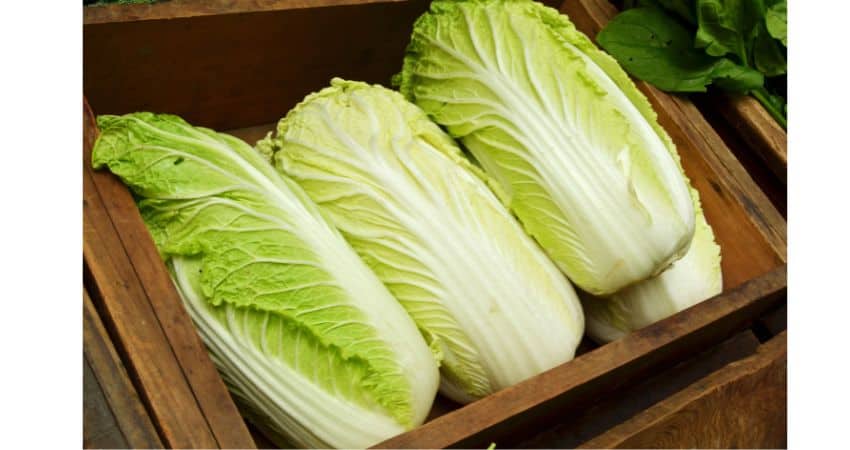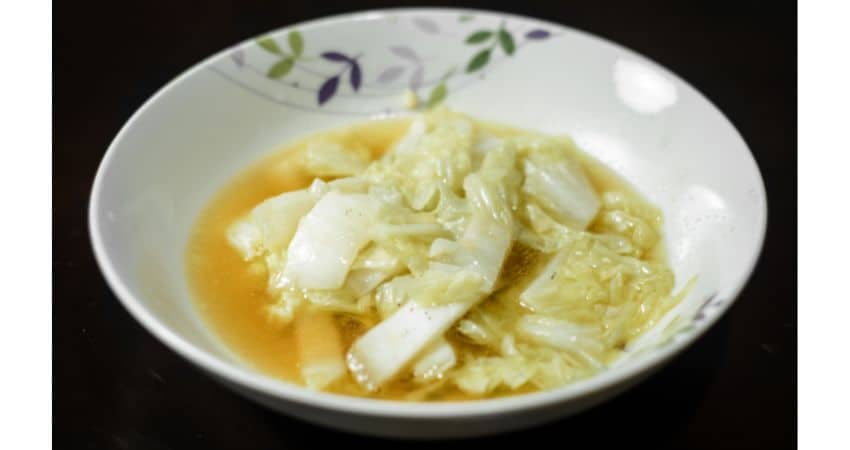10 Health Benefits of Chinese Leaf
Aside from being delicious, many people might be wondering how Chinese leaf or cabbage is good for you.
The 10 health benefits of Chinese leaf include:
- A good source of vitamins and minerals.
- Contains antioxidants.
- Lower bad cholesterol.
- Weight Loss.
- Improve skin health.
- Eye health.
- Strong bones and teeth.
- Helps lower blood pressure.
- Strengthen immune system.
- Heart health.
This article will examine each benefit in complete detail including which vitamins and minerals it provides the most. In addition, if it’s good for weight loss and more. Chinese leaf is also known as Chinese cabbage, Napa cabbage, Oriental cabbage and Peking cabbage.

Health Benefits of Chinese Leaf
As a Certified Health Coach many clients ask me about healthy food including Chinese leaf. I also consume and have it in my house all the time. Therefore, I have researched this topic in the past and present. Let’s examine it closely starting with nutrients.
1. A Good Source of Vitamins and Minerals.
Chinese leaf or cabbage offers a wide variety of vitamins and minerals, making it a healthy addition to many dishes1. Let’s take a look at the vitamins and minerals2.
Vitamin B9 (Folate)
Most notably, Chinese leaf has high levels of vitamin B9, also known as folate. B9 boosts metabolism by assisting the body converting food into energy. In addition, it’s beneficial to cardiac, circulatory and hematological health.
In addition to B9, it is a source of other complex B vitamins, including Riboflavin and Thiamin. However, they are not at as high of levels as vitamin B9.
Vitamin C
Vitamin C is an important vitamin to overall health. It boosts the immune system and helps prevent minor illnesses like the common cold and the flu. One cup provides 52% of the daily recommended value.
Vitamin K
Vitamin K strengthens the bones and helps maintain healthy levels of calcium in the bloodstream. One cup provides 40% of the daily recommended value.
Vitamin A
One cup of Chinese leaf provides 63% of the daily recommended value. Vitamin A is important for vision, the immune system and reproduction. It also helps the lungs, heart ad other organs to operate properly.
Manganese
Manganese is a mineral assisting the blood to form essential clots. It helps to strengthen bones, connective tissue and overall blood health. In addition, manganese is crucial to proper cognitive and nerve functions.
Iron
Iron is crucial to maintaining the proper health and level of red blood cells in the system. Red blood cells carry oxygen from the lungs to all parts of the body. Iron is also needed to make some hormones.
Calcium
A single cup of Chinese leaf contains about 7% of the daily value needed. Calcium is important in maintaining bones and muscles. It’s not naturally produced by the body, which makes finding ways to include it in your regular diet all the more crucial.
Potassium
One cup contains 176 mg of potassium. Potassium is crucial for the body and kidneys to operate efficiently. A 4:1 potassium to sodium ratio is important for the kidneys and water retention.
Chinese cabbage is not a high protein food. It provides 1.0 gram of protein per one cup. One gram of protein is 2% of the daily recommended value.
Chinese Leaf Nutrition Facts
| Nutrients | Chinese Leaf (1 Cup) |
| Calories | 9.1 |
| Carbohydrates | 1.5 g |
| Protein | 1.0 g |
| Fat | 0.1 g |
| Fiber | 0.7 g – 3% |
| Vitamin A | 3,128 IU – 63% |
| Vitamin C | 31.5 mg – 52% |
| Vitamin K | 31.8 mcg – 40% |
| Vitamin B9 (Folate) | 46.2 mcg – 12% |
| Calcium | 73.5 mg – 7% |
| Iron | 0.6 mg – 3% |
| Potassium | 176 mg – 5% |
| Manganese | 0.1 mg – 6% |
2. Contains Antioxidants.
Chinese leaf contains the following antioxidant plant compounds:
- Lutein
- Zeaxanthin
- Carotenes
- Thiocyanates
- Sulforaphene
- Indole-3-carbinol
- Isothiocyanates
Antioxidants are important because they protect the body’s cells from free radicals. The free radicals cause oxidative stress and harms the cells.
Oxidative stress is linked to disease and illness like cancer, heart disease, arthritis, immune deficiency, inflammation and more3.
3. Lower Bad Cholesterol.
The antioxidizing compounds naturally present in Chinese leaf are helpful in managing low-density lipoprotein, or bad cholesterol4. This is helpful for those inclined to have high cholesterol.
A study released in 2018 indicated how natural food antioxidants helped lower cholesterol and oxidative stress.
4. Weight Loss
Many of my clients are looking to lose weight. For this reason, some of them have asked about Chinese leaf for weight loss.
Chinese leaf is good for weight loss because it is high in fiber, low in calories and fat. The surplus of vitamins stored in the leafy greens boosts metabolism which accelerates the rate of weight loss.
In combination with this, its plant compounds help lower bad cholesterol, which is helpful for losing weight. One cup of Chinese leaf only contains 9.1 calories.
There are many health benefits of Chinese leaf, but the essence of its health value is it boosts metabolism and lowers cholesterol. This makes an excellent resource for weight loss and maintaining a healthy lifestyle.

5. Improve Skin Health.
There are natural antioxidants in Chinese leaf or Napa cabbage beneficial to maintaining healthy, attractive skin5. Elements like beta-carotene and vitamin C naturally assist in preventing blemishes and clogged pores.
The antibacterial and antiseptic properties help fight skin infections including one, pimples and eczema. In addition, it can help with skin blemishes, discolorations, wrinkles and allergies.
Including this healthy food as a regular staple in your diet can help keep your skin beautiful and healthy as you get older.
6. Eye Health
As noted earlier, one cup of Chinese leaf contains 62% of the daily recommended number of Vitamin A. One of the most important benefits of vitamin A is reducing vision loss and macular degeneration.
In addition, vitamin A can help boost the immune system and decrease eye infections and inflammation. Consuming this healthy veggie at dinner takes care of over half the daily number needed.
Vitamin A deficiency can lead to eye disease starting with night blindness, dry eyes and tear ducts. Studies have shown diets high in vitamin A can reduce the risk of cataracts6.
7. Strong Bones and Teeth.
Chinese leaf contains a high amount of calcium, vitamins A, K and C which are all beneficial for bone health. Vitamin K helps attract calcium to the bones. In addition, low levels of K is associated with lower bone density and increased risk of fractures.
Vitamin C helps with the formation of collagen. While most people associate collagen with skin, it’s the foundation bone mineralization is built on. Scientific research has shown a connection with higher vitamin C levels and greater bone density7.
8. Helps Lower Blood Pressure.
Chinese leaf contains a high percentage of potassium, calcium, vitamin C and folate. All of these vitamins and minerals are beneficial for lowering blood pressure.
Research from Johns Hopkins School of Medicine has shown taking 500 mg of vitamin C daily is beneficial for BP8.
Studies have shown a connection with low calcium intake and high blood pressure. According to Harvard Health, calcium helps control the relaxing of blood vessels which can keep blood pressure low9.
9. Strengthen Immune System.
Chinese leaf can help improve the immune system because it’s an important source of vitamins C and A and contains iron, zinc and selenium. Consuming nutrients is required for the health of the body’s immune cells.
The nutrients have been associated with the growth and function of immune cells. It is known, a diet low in vegetables suppresses immunity10.
10. Heart Health.
Two of the previously mentioned benefits, cholesterol and blood pressure, already spell out how Chinese leaf or Napa cabbage can benefit heart health. Lower blood pressure means the heart works less harder to pump the blood through the blood vessels.
High cholesterol leads to blocked and narrowed arteries which make the heart work harder to pump the blood. In addition, vitamins A, K and C, calcium, potassium and manganese are all helpful for the heart to function efficiently11.
If you have any questions to ask me about this article don’t hesitate to comment below or email us. You can find an email on our contact page.
Read Next – More Anti-Aging Food Articles
Will Almond Milk Break My Fast?
Are Cabbage Rolls Healthy? (Everything You Need To Know)
What Is Blanched Almond Flour and Its Benefits
Can Almond Milk Cause Constipation? (We Find Out)
- National Center for Biotechnology Information: Stir-Frying of Chinese Cabbage and Pakchoi Retains Health-Promoting Glucosinolates [↩]
- NutritionData: Cabbage, Chinese (pak-choi) [↩]
- National Center for Biotechnology Information: Antioxidant Capacities and polyphenolics of Chinese cabbage (Brassica raps L. ssp. Pekinensis) Leaves [↩]
- National Center for Biotechnology Information: Inhibitors for cholesterol ester accumulation in macrophages from Chinese cabbage [↩]
- The Old Farmer’s Almanac: 5 Reasons You Should eat Cabbage [↩]
- National Center for Biotechnology Information: Association of vitamin A and B-carotene with risk for age-related cataract: a meta-analysis [↩]
- American Bone Health: Vitamins for Bone Health [↩]
- Johns Hopkins Medicine: Big Doses of Vitamin C May Lower Blood Pressure [↩]
- Harvard Health: Key minerals to help control blood pressure [↩]
- Harvard T.H. Chan: Nutrition and Immunity [↩]
- Harvard Health: Calcium and heart disease: What is the connection? [↩]
